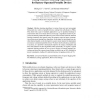Free Online Productivity Tools
i2Speak
i2Symbol
i2OCR
iTex2Img
iWeb2Print
iWeb2Shot
i2Type
iPdf2Split
iPdf2Merge
i2Bopomofo
i2Arabic
i2Style
i2Image
i2PDF
iLatex2Rtf
Sci2ools
110
click to vote
AIRS
2010
Springer
2010
Springer
Tuning Machine-Learning Algorithms for Battery-Operated Portable Devices
Machine learning algorithms in various forms are now increasingly being used on a variety of portable devices, starting from cell phones to PDAs. They often form a part of standard applications (e.g. for grammar-checking in email clients) that run on these devices and occupy a significant fraction of processor and memory bandwidth. However, most of the research within the machine learning community has ignored issues like memory usage and power consumption of processors running these algorithms. In this paper we investigate how machine learned models can be developed in a power-aware manner for deployment on resource-constrained portable devices. We show that by tolerating a small loss in accuracy, it is possible to dramatically improve the energy consumption and data cache behavior of these algorithms. More specifically, we explore a typical sequential labeling problem of part-of-speech tagging in natural language processing and show that a power-aware design can achieve up to 50% red...
Related Content
| Added | 28 Feb 2011 |
| Updated | 28 Feb 2011 |
| Type | Journal |
| Year | 2010 |
| Where | AIRS |
| Authors | Ziheng Lin, Yan Gu, Samarjit Chakraborty |
Comments (0)

